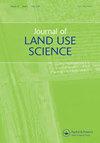Conservation frontiers: understanding the geographic expansion of conservation
IF 3.3
4区 环境科学与生态学
Q1 AGRICULTURE, MULTIDISCIPLINARY
引用次数: 4
Abstract
ABSTRACT Land-use frontiers, such as agriculture expanding into forests, remain a major driver of biodiversity loss, and often lead to conservation responses. To better understand the geographies of conservation, connecting conservation with tools used widely in Land System Science – particularly the frontier concept – allows assessing the patterns, actors, and drivers of conservation. We propose that land conservation can be analysed through three different perspectives. First, conservation can be framed as efforts to slow or stop other frontiers. Second, the expansion of conservation could itself be described as a frontier process, similarly leading to institutional and cultural reorganization, and sometimes conflicts (e.g. green grabbing). Third, frontiers can be seen as spaces where multiple land uses, including conservation, interact. Analysing conservation through these perspectives could be particularly powerful to thoroughly consider the social-ecological contexts in which conservation happens, and thus to bridge the disciplines of Land System Science and Conservation Science.保护边界:了解保护的地理扩展
摘要土地利用边界,如农业向森林扩张,仍然是生物多样性丧失的主要驱动因素,并经常导致保护反应。为了更好地了解保护的地理位置,将保护与土地系统科学中广泛使用的工具联系起来——特别是前沿概念——可以评估保护的模式、参与者和驱动因素。我们建议可以从三个不同的角度来分析土地保育。首先,保护可以被定义为减缓或阻止其他边界的努力。第二,保护的扩大本身可以被描述为一个前沿过程,类似地导致制度和文化重组,有时还会引发冲突(例如抢绿)。第三,边界可以被视为包括保护在内的多种土地利用相互作用的空间。从这些角度分析保护可能特别有助于深入考虑保护发生的社会生态环境,从而为土地系统科学和保护科学学科架起桥梁。
本文章由计算机程序翻译,如有差异,请以英文原文为准。
求助全文
约1分钟内获得全文
求助全文
来源期刊

Journal of Land Use Science
Environmental Science-Management, Monitoring, Policy and Law
CiteScore
5.40
自引率
6.20%
发文量
26
期刊介绍:
The Journal of Land Use Science provides a central outlet for high-quality articles on theoretical and empirical aspects of land-use science at the interface of social and environmental systems. The Journal brings together an array of research perspectives at multiple temporal, spatial and social scales that contribute a better understanding of land-system dynamics and communicate scientific advances towards attaining land-system sustainability.
 求助内容:
求助内容: 应助结果提醒方式:
应助结果提醒方式:


